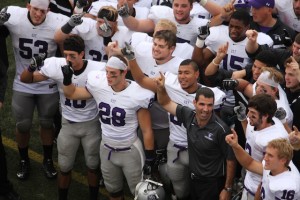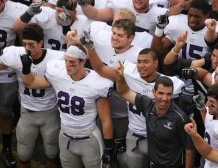The Tommie football team ran up scores of 45, 49, 48 and 63 through its first five games, and it may have hurt a few feelings along the way.

I have always believed that if you don’t want the other team to score so much then play better defense. Maybe when you’re playing tee ball it is about making everyone feel like a winner; that is what plastic participation trophies are for.
When all of your players are adults there are other lessons to be learned. I will admit that it is more complicated than every team just scoring as much as they possibly can. I’ll also admit that it sucks to see your team get smashed, as a Minnesota sports fan, I know.
Before you accuse a team of brashly running up the score, consider everything that goes into the game. Consider the players who are trying to get the most of their finite careers. Consider the coaches who are in one of the more fickle professions in our unpredictable economy, and consider the nature of the game being played. Fans are supposed to get emotional about the results of games. When the Tommies crush your football team, by all means get hot about it. But don’t think for a second that it is personal.
I’ve watched each Tommie football game this season, and I’ve heard opposing fans’ frustration first hand in the press boxes.
“Are they trying to score again before the end of the quarter?”
“Why are their starters still in?”
“This is why nobody likes St. Thomas.”
As if coach Glenn Caruso called the play to hurt the other teams’ feelings and stuck his tongue out at them afterwards? It is rare for a coach to purposely show up a peer, and a look into recent history shows that a coach who runs up the score is risking his or her job. For example, in 2009 a girl’s high school basketball coach in Texas was fired after a 100-0 win.
If the aim is simply to score points and win games, this coach had a career day and deserves a raise. Instead, the coach was fired.
A sane coach’s priority list should consist of keeping his or her job, securing a win, testing his or her players, preventing injuries, appeasing parents and boosters, enjoying the game, remembering to pick up milk on the way home, thinking of a cool way to carve his or her jack o’ lantern. These are all above worrying about embarrassing or upsetting the other team’s fans.
It would also be short-sighted to hold a grudge against the players who are dominating your team, even the kid who scored the 14th touchdown to make it 98-12. A player’s focus has to stay on doing his or her job while on the field.
If a starting running back starts running soft because his team is winning by a lot, he won’t be a starting running back much longer. When the backup comes in during a blowout, can you blame him for trying to make a big play and get recognized? No.
You can’t blame the coaches, who are considering many factors more palpable than the pride of opposing fans. You can’t blame the players, who are just out there having fun and trying to prove themselves. Then who is at fault? The answer is nobody.
Sports allow for a self-regulating system, so games rarely get out of hand. It begins simply. On the field both teams are trying to stop each other. All that players have to consider is how to score and stop the other team from scoring. On the next level, coaches occasionally have to call off their players if they are running wild, which for the previously mentioned reasons, they almost always do. Ultimately, the dejected and begrudged fans factor in too. Coaches and players don’t want to be hated, if only because it is impractical, and when people in the bleachers start to grumble, people on the sidelines hear it.
So to the Hamline fans, the Gustavus fans, the Carleton fans, if later this fall you find your team down by plenty to the Tommies and you want to scream about it, I say go ahead. But don’t take it personally.
Alex Keil can be reached at amkeil@stthomas.edu. 




Very pertinent though perhaps a little to cocky in tone even for a fellow tommie. However, very good point. If you want to play football for fun, it ends in high school, everything beyond has way to much financial backing, even at the D3 level to be seen as just a game, when in all reality it’s a business. No one wants to see their beloved team get crushed, but blaming the opposing team’s players and coaching staff is a poor coping mechanism.
I love it when we score, its fun.